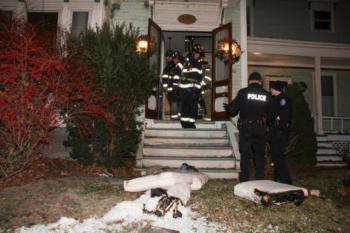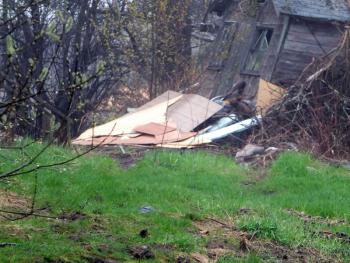ROCKLAND – A bill aimed at banning the sale of new, flame-retardant, upholstered furniture in Maine has passed its first hurdle. Wednesday, May 24, the House of Representatives voted 139 to five in support of the measure, sparking hope to firefighters throughout the state as well as here in the Midcoast.
Flame-retardant chemicals were once considered to be life and property savers. Saturated into furniture, rugs and even clothing, the chemicals were thought to dramatically slow the spread of fire.
However, following a noticeable increase in cancer throughout the fire-fighting community, and new studies about the retardants, there is a trend away from the chemicals.
Rep. Walter Kumiega, D-Deer Isle, sponsored Maine Legislative Bill LD182 An Act To Protect Firefighters by Establishing a Prohibition on the Sale and Distribution of New Upholstered Furniture Containing Certain Flame-retardant Chemicals, which Representative John Spear of South Thomaston has publicly supported.
Studies indicate that the chemicals do not prevent products from burning, as previously suggested, nor do they slow the burn by any noticeable amount.
And when aflame, their toxins enter the air, linger on clothing and equipment, and transfer to all surfaces touched by firefighters and first responders. Worse, the toxins enter the skin, the mouth, the lungs.
Though cancer diagnosis cannot always be traced back to one source, Elliot Scott, of Owls Head, believes that the retardants contributed to the cancer that took of the lives of two Midcoast firefighters.
Walter Yattaw, of Owls Head, learned of his non-Hodgkins Lymphoma in 2012. Cushing Assistant Fire Chief Joe Yamello was diagnosed with lung cancer in 2013.
“It’s sad, going to funerals of firefighters who don’t make it to old age,” said Scott, who is an emergency medical technician for South Thomaston, a volunteer firefighter for Owls Head, and member of the Maine State Federation of Firefighters. “It’s a painful disease, and it’s also bad psychologically for them and their family and friends.”
Advocates of the ban on fire-retardant chemicals also are working to change firefighter habits: Wash the soot off the face, don’t leave dirty equipment in personal vehicles, invest in specially-designed air masks, disinfectant cleanses, and take turnout gear to the launderers.
A warning of possible health hazards for responders, however, is not enough to stop them from entering burning buildings, according to Scott. Their motto: For life and property.
“Risk a lot to save a lot.”
Now, a new way of proceeding. Retaining old uniforms to use while the newer ones are dirty. Scrubbing down all equipment. Washing the seats of fire trucks. Quick body cleanses with baby wipes.
During the bill’s public hearing, firefighters, scientists and medical professionals all testified in support of the measure, according to a news release from Representative Kumiega’s office.
Currently 8,000 career and volunteer firefighters are active in Maine.
Gerry Gay, a Sanford firefighter representing the Professional Firefighters of Maine said in the release: “In 2016, 190 firefighters died in the line of duty. More than half of those deaths were from occupational-related cancer. We know that not every flame retardant chemical has proven to be a carcinogen or toxic in some other way. But we don’t want to keep repeating the pattern of banning a few of those chemicals, only to see them replaced by other chemicals that we find out much later are just as harmful.”
Emma Halas-O’Connor, of the public health and safety advocacy group, Prevent Harm, told committee members at the hearing that chemical manufacturing companies make new, almost identical substitute chemicals faster than federal regulators are able to assess their safety. She encouraged Maine to act rather than wait potentially decades until the federal backlog is cleared while more and more people are exposed to cancer-causing fumes and dust.
“We can close the toxic chapter of flame retardant chemicals in residential furniture once and for all,” said Halas-O’Connor. “Let’s not wait around.”
Other groups supporting the legislation include the Maine Chapter of the American Academy of Pediatrics, the American Lung Association and the Silent Spring Institute.
The bill now faces further votes in both the full House and Senate.
Kumiega is serving his fourth term in the Maine House and represents the Cranberry Isles, Deer Isle, Frenchboro, Isle au Haut, North Haven, Southwest Harbor, Stonington, Swan’s Island, Tremont, Vinalhaven and Marshall Island Township.
Reach Sarah Thompson at news@penbaypilot.com


DSCF5764.jpg)























